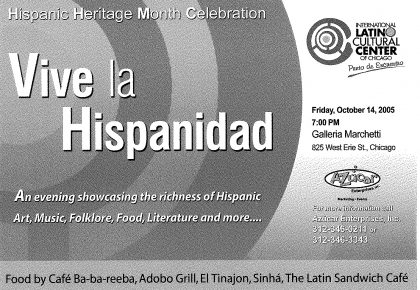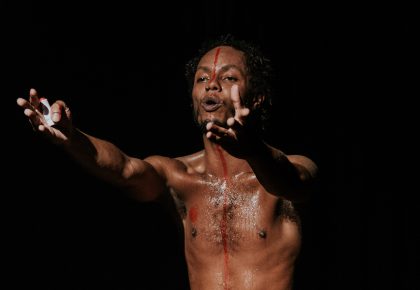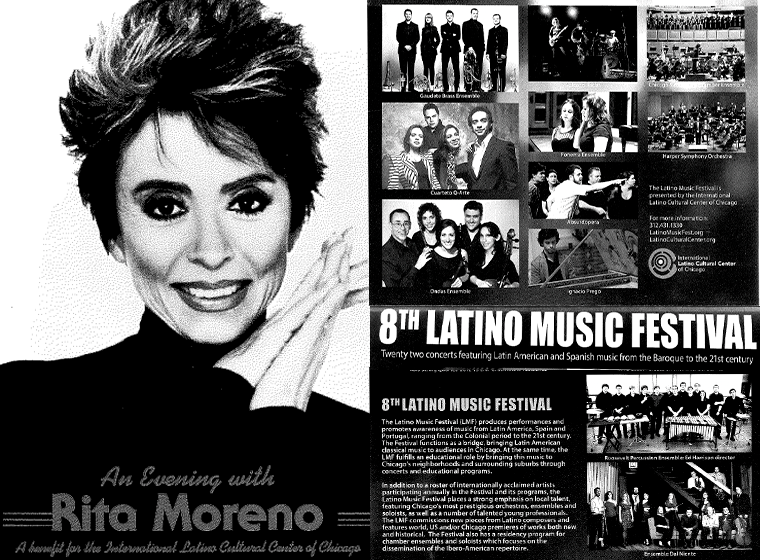
This is the first of a two-part “sub-series” in a series of columns celebrating the 25th anniversary of the International Latino Cultural Center of Chicago and its many accomplishments. The ILCC is currently engaged in a fundraising campaign to raise the funds necessary to help the organization increase its free citywide programming as well as create new multi-disciplinary programming and fund the infrastructure that will make these programs possible.
The International Latino Cultural Center’s programming is built around seven programming pillars: film, music, dance, theater, the culinary arts, the visual arts and literature. Of these seven pillars, music, without a doubt, is the ILCC’s second largest program after film.
And for good reason. As the late Dick Clark said, “music is the soundtrack of our lives.” Walk down any street of Latin America or Spain or even the Latino barrios of the United States, step into any Latino restaurant or business or household and you will be surrounded by the sounds of any of the dozens of rhythms from the Latino diaspora coming from radios, stereo systems or any other device. According to Nielsen, Latino “consumers spend 32 hours a week listening to music, outpacing non-Hispanic Whites and the total U.S. population. Radio—both online and terrestrial—remains a key source of music for Latinx, who consume far more radio than the total U.S. population.”
THE ILCC MAKES A GRAND MUSICAL ENTRANCE
Based on the materials available on the ILCC archives, music programming at the turn of the century and for the next 20 years consisted of two strands: individual concerts that truly reflected the sheer diversity of Pan-Latino musical expressions and, from 2006 until 2019, programming focused exclusively on classical, experimental and instrumental music from Iberoamerica and the United States through an annual three-month long Festival in the fall.
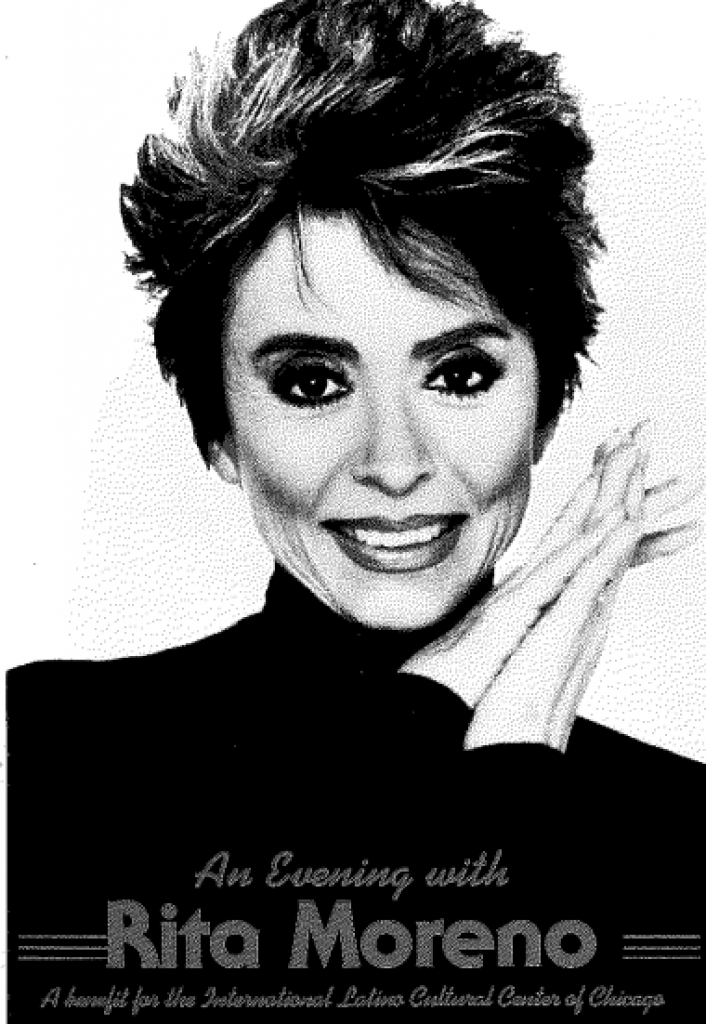
The first concert of the new decade, century and millennium of which the the newly rebranded ILCC has any record of on its archives featured the one and only, the queen of the EGOTs (term used to refer to those artists who have won the Emmy, the Grammy, the Oscar and the Tony) Rita Moreno. And if that was, indeed, truly the first concert of the 2000s for the ILCC, what a way to kick off the newly rebranded organization!
Held on March 8, 2001 at the now shuttered Black Orchid Classic Nightclub on the Pipers Alley Complex in Chicago’s Old Town neighborhood, An Evening with Rita Moreno, was a cabaret-style performance featuring a range of Broadway tunes, jazz, blues, Latin music and even swing, with a couple of stories and anecdotes thrown in for good measure.
The ILCC presented Rita that evening with the Gloria Lifetime Achievement Award for her outstanding artistic contributions and humanitarian contributions to society. Then 26th Ward Alderman Billy Ocasio also presented her with an official proclamation declaring March 8 as Rita Moreno Day. Proceeds of the event, which included cocktails and a buffet dinner, were used to fund the ILCC’s operations and events.
The ILCC ramped up its music programming that fall, beginning with Ellas y su rumba: The Women of Latin Music on September 13, 2001 at Three Arts Club in the Gold Coast neighborhood, a residence built in 1914 for young women studying music, drama and the visual arts. The music and dance program featured several local women artists including dance instructor Lisa “La Boriqua” from Latin Street Dancing, Ensemble Español founder Libby Komaiko, and singer Clara Beatriz Jaramillo, among others. Today, this historic venue is part of a redesigned 70,000 square foot design gallery blurring, according to its website, “the lines between residential and retail, indoors and outdoors, home and hospitality.”
The Three Arts Club would also be the host for a special performance by Spanish classical pianist Sylvia Torán with reception and silent auction on October 5, 2001, the third of three performances she offered throughout the city, including one on October 1 at Columbia College’s Music Center and on the 3rd at Northeastern Illinois University’s Recital Hall.
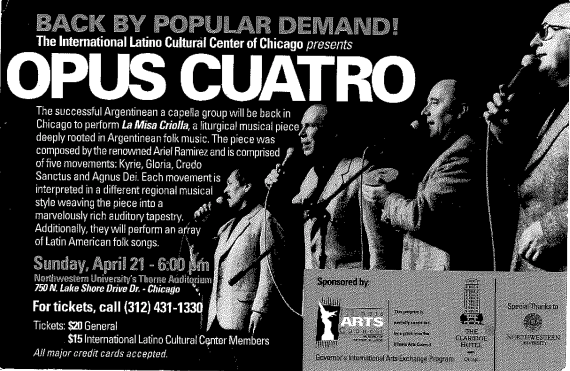
Tango reared its head again two weeks later, on October 14, with a performance (originally scheduled for April 21) from Opus Cuatro, the highly acclaimed Argentinian a cappella group featuring a special guest appearance by Chicago dance studio Tango 21 at the University of Illinois-Chicago’s Inner Circle Auditorium. Then, in partnership with the Chicago Humanities Festival, the ILCC presented a program of Ecuadorian dance and music on November 10, 2001 at Vittum Theater in West Town. The program included a performance by Ecuadorian dancer Wilson Pico of The Materials of Rage and Love, a series of solo dances, and musical group Tribus Futuras performing selections from their album Children of the Wind.
However, the true highlight of this fall season was the Chicago debut of acclaimed Cuban pianist Ernán López-Nussa at the Getz Theater on September 26. A founding member of the jazz fusion group Afrocuba and himself the head of a music dynasty (not unlike the Valdés and Rubalcaba dynasties) that includes pianist Harold López-Nussa and drummer Ruy Adrián López-Nussa (nephews), Ernán performed tracks from his landmark album From Havana to Rio while revisiting the history of Cuban piano music.
And that was only 2001!
Additional musicians presented by the ILCC in the following five years include: David Puerta, master of the Colombian tiple, a twelve-string instrument, three-fourths the size of a classical guitar at Vittum Theater on July 18, 2002 as part of Chicago’s Colombian Independence Day celebrations; Peruvian guitarist and charango player Julio Humala at Loyola University’s Sullivan Center on July 26, 2002; a special Christmas concert featuring Latin jazz and salsa pianist Samuel del Real on December 11, 2002 at the Hothouse; and a taste of things to come: A Musical Journey Through Latin America Art Songs, a selection of classical vocal music interpreted by Colombian soprano Patricia Caicedo and pianist Eugenia Gassull on piano at Columbia College’s Concert Hall on October 5, 2005.
A rare Chicago performance by Brazil’s “Godmother of samba” Beth Carvalho at the Logan Square Auditorium on June 23, 2005 was another significant highlight of the ILCC’s musical programming in these first five years of the new decade, century and millennium. Recognized with a Latin Recording Academy® Lifetime Achievement Award at the 13th Annual Latin GRAMMY Awards® and a Latin GRAMMY® for Best Samba/Pagode Album for Nosso Samba Tá Na Rua, Carvalho helped bring underrated composers the recognition they deserved, becoming a driving force in the modernization of samba in the ’80s, while preserving its roots. She passed away in 2019.
A SHIFT IN MUSICAL GEARS
In 2006, the ILCC’s music programming shifted gears: for the following 13 years, it would be dominated by classical, instrumental and avant-garde concerts from Latin America, Spain and Latino musicians living in Chicago. It started with two concerts at St. James Cathedral and Columbia College on October 21 and 27, 2006 under the banner First Latino Symphonic Festival of Chicago. Positioned as “a premier concert series of Latino composers by Latino soloists designed to pay homage to Latin American and Spanish composers in the field of classical music,” the festival featured the world premiere of Gustavo Leone’s Cantico del Popol Vuh performed by the Latino Chamber Orchestra and DePaul University’s Chorus and a performance by the Latino Chamber Musicians of music by Joaquín Turina, Alberto Ginastera and Manuel de Falla, among others.
The following year, under the artistic direction of composers and musicians Elbio Barilari and Gustavo Leone, the Festival changed its name to the Latino Music Festival, and pretty quickly became Chicago’s only Latin American music festival dedicated in its entirety to Latin American, Spanish and Portuguese classical, instrumental and experimental music in all its forms, from solo performances to string quartets to orchestral arrangements.
That first festival under Barilari’s and Leone’s direction presented seven free concerts and one public forum on Latin American music with Grammy® Award winning classical composer Osvaldo Golijov (then a composer-in-residence at the Chicago Symphony Orchestra), from October 28-December 16, 2007. Locations included Lake Forest College, Chicago Cultural Center’s Preston Bradley Hall, Merit School of Music, Orchestra Hall (now Symphony Center), and Columbia College.
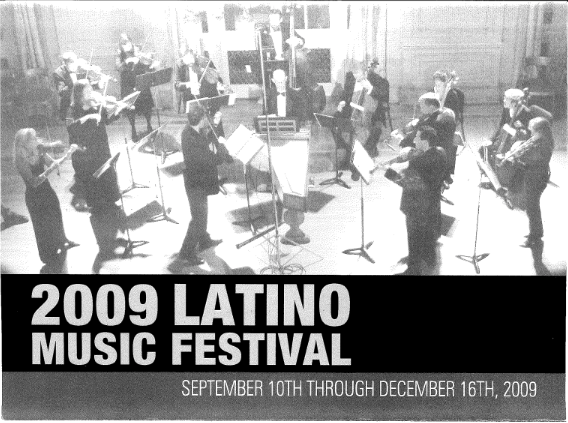
The following year, the Festival featured 16 concerts of Latin American and Spanish Music from the Baroque to the 21st Century over three and a half months in such venues as the Harris Theatre for Dance and Music, Ravinia Festival, Symphony Center, Chicago Cultural Center, DePaul University, Merit School of Music, The International House, St. Luke’s Lutheran Church and Lyon & Healy Concert Hall. The number of concerts went up to 20 in 2009 and so did the number of venues which now included the Art Institute of Chicago, SPACE in Evanston and the University of Wisconsin-Parkside in Kenosha.
By 2012, the number of concerts had increased to 27. For the following seven years, the number of concerts would average between 20-24 per year.
Festival highlights include: Fareed Haque’s “Hymn of the Ancients,” an exploration of classical Indian music at the Humboldt Park Boathouse; a concert by the legendary Paquito D’Rivera celebrating the second anniversary of WFMT 98.8’s nationally syndicated radio program “Fiesta!”, hosted by Barilari; a special performance of Quilapayún’s “Cantata Santa María de Iquique” by Chicago’s very own Sones de Mexico Ensemble about the struggle of the workers on the salt fields of northern Chile in the early part of the 20th Century; and the Chicago debut of the Recycled Instruments Orchestra of Cateura, an orchestra comprised of boys, girls, teenagers and young adults with limited access to resources, who live in the Bañado Sur community, located next to the Cateura landfill, in Asuncion, Paraguay who perform musical pieces using instruments elaborated with garbage reclaimed from the landfill.
Then came COVID-19. The pandemic gave ILCC executive director Pepe Vargas the opportunity to reinvent the Festival as a year-round music series that would present a wide overview of the many musical styles representing the Latino diaspora worldwide. The ILCC formally launched the series in 2021 with seven virtual concerts featuring Spanish pianist/composer Carlos Bianchini’s audiovisual avant-garde spectacle Yo, Piano; a centennial celebration of the works of Argentinian composer Astor Piazzolla by the KFune Duo (Sept. 29); and a musical tribute to Spanish poet Federico García Lorca by Colombian soprano Wilma Rueda and German guitarist Christian Reichert. The concerts were made available virtually to residents of Illinois and the Midwest states of Minnesota, Iowa, Wisconsin, Michigan and Indiana.
End of Part One.
As part of its fundraising campaign commemorating its 25th anniversary, the International Latino Cultural Center will be hosting a dinner celebration at CineCity Studios, 2429 West 14th St. on Friday, November 14, featuring a solo performance from Grammy® and Latin Grammy® Award winning artist Alex Cuba and the very best in Latino cuisine. Doors open at 6 p.m. For more information, visit the ILCC’s official fundraising dinner page.
Unable to make the event? Never fear, you can still be part of our campaign with your individual contribution. Every single bit helps our mission to preserve in the city of Chicago a space for Pan-Latino arts in all its glorious disciplines. For more information on individual giving visit our individual giving page.
The International Latino Cultural Center of Chicago is a 501(3)(c) nonprofit cultural organization. All contributions are tax-deductible to the full extent allowed by the law.

